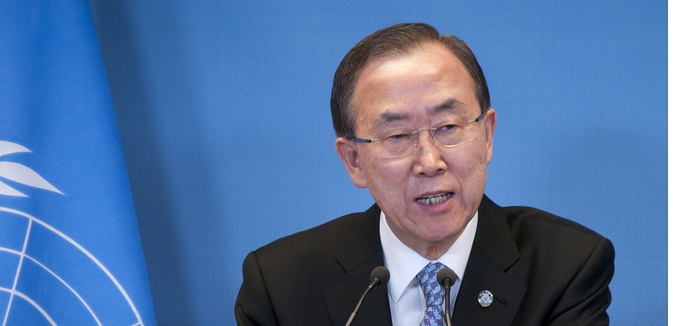In one of his final acts in office on December 30, outgoing United Nations Secretary-General Ban Ki-moon submitted a confidential report to the UN Security Council alleging that Iran may have violated an international arms embargo by smuggling weapons to the Lebanese terror group Hezbollah, Reuters reported Sunday.
The report also contains a charge from the French government that an arms shipment seized in the Indian Ocean in March originated in Iran and was intended for fighters in Somalia or Yemen.
UN Security Council Resolution 1701, which was not altered by the lifting of nuclear-related sanctions as part of last year’s deal with global powers, specifically prohibits the transfer of arms to Hezbollah. Iran is also “subject to an arms embargo and other restrictions, which are not technically part of the nuclear agreement,” Reuters noted.
Ban cited a speech that Hezbollah chief Hassan Nasrallah gave in June, in which Nasrallah claimed that all of its “rockets and weapons are from the Islamic Republic of Iran.” “I am very concerned by this statement, which suggests that transfers of arms and related materiel from the Islamic Republic of Iran to Hezbollah may have been undertaken contrary (to a Security Council resolution),” Ban wrote.
Iran’s mission to the United Nations did not explicitly deny the claim, saying that “measures undertaken by the Islamic Republic of Iran in combating terrorism and violent extremism in the region have been consistent with its national security interests and international commitments.”
The report was a follow-up to one Ban submitted to the Security Council in July, when he charged that Iran had tested ballistic missiles in March, which was “not consistent with the constructive spirit” of the nuclear deal. In his most recent report, however, Ban wrote that “no information regarding Iranian ballistic missile activity or ballistic missile-related transfers … were brought to my attention or that of the Security Council.” (Iran released a video in September showing what it said was a successful ballistic missile launch.)
The Security Council has refused to take action against Hezbollah for violations of 1701.
While arguing in favor of the nuclear deal, Secretary of State John Kerry said that the United States would strictly enforce the embargo on smuggling weapons to the terror group. “For those things that we may want to deal with because of [Iran’s] behavior, for instance, Hezbollah, there is a UN resolution, 1701, the prevents the transfer of any weapons to Hezbollah. That will continue and what we need to do is make sure that we’re enforcing it,” Kerry told the Senate in July 2015.
Hezbollah reportedly has an arsenal of 130,000 rockets, more than the combined total of all 27 non-U.S. NATO member states.
According to a July 2016 report published by the Foundation for Defense of Democracies, Israeli officials believe that any future war with Hezbollah has the potential to cause “thousands of civilian deaths” in Israel. Hezbollah has, among other things, threatened to attack ammonium tanks in Haifa, which could kill tens of thousands of people.
The think tank’s vice president for research, Jonathan Schanzer, explained that Hezbollah’s widely-reported tactic of hiding military assets in civilian areas would also lead to mass casualties. Reports emerged in 2014 that Hezbollah was offering reduced-price housing to Shi’ite families who allowed the terrorist group to store rocket launchers in their homes. An Israeli defense official told The New York Times in May 2015 that the buildup of Hezbollah’s terror infrastructure in southern Lebanese villages meant that “civilians are living in a military compound” and that their lives were at risk. A few days later, a newspaper linked to Hezbollah bolstered the Israeli assessment.
Research analyst David Daoud argued last month in Newsweek that if the U.S. under President-elect Donald Trump defeated ISIS in Syria but left Syrian dictator Bashar al-Assad in power, “instead of starving Hezbollah, it would empower that implacable enemy of the United States—one which has already proven itself a formidable threat to Americans.”
[Photo: Ministerie van Buitenlandse Zaken / Flickr ]




